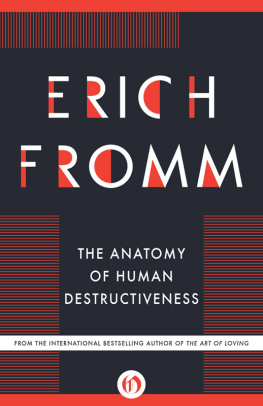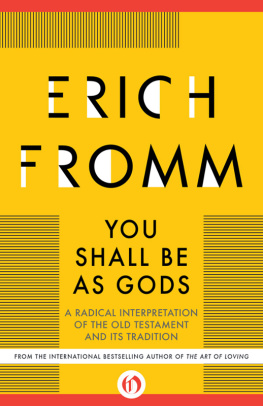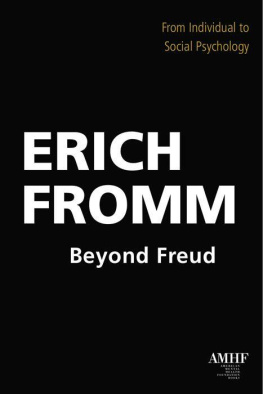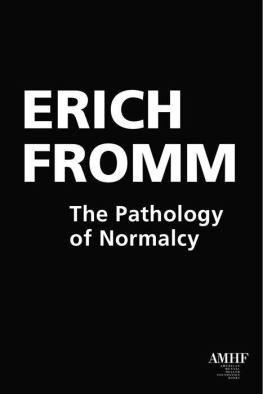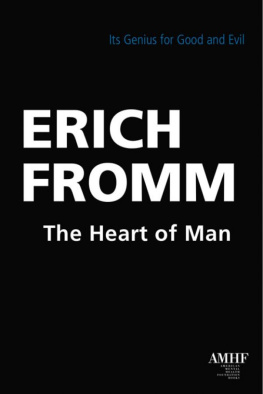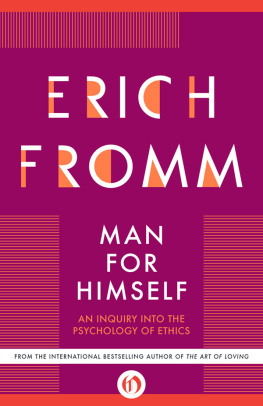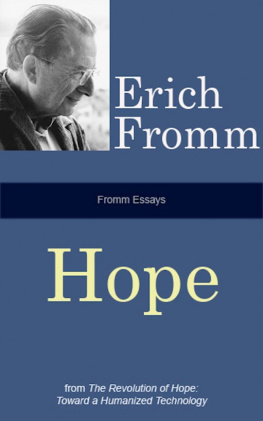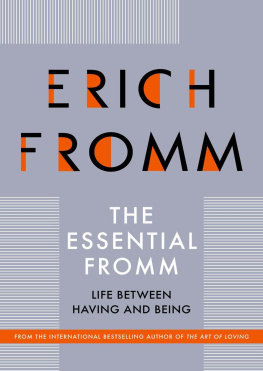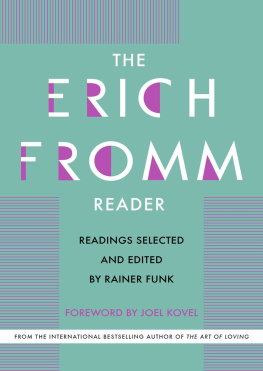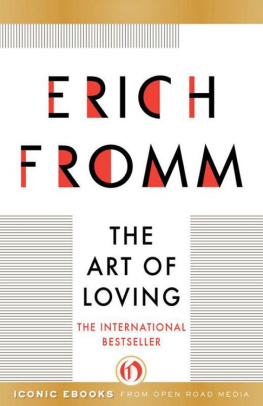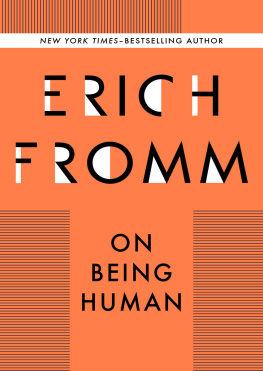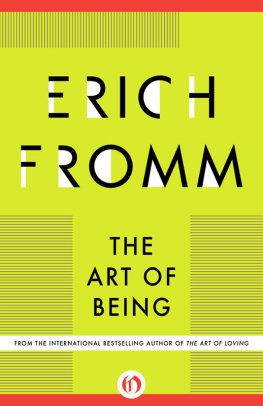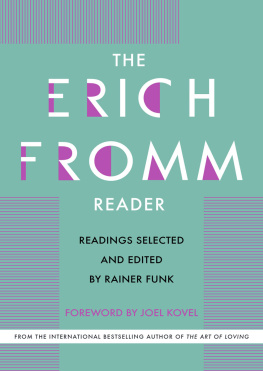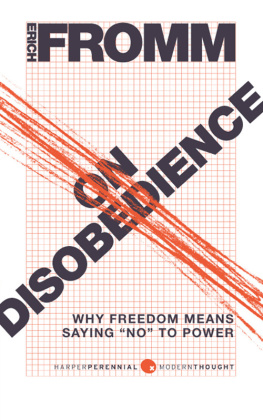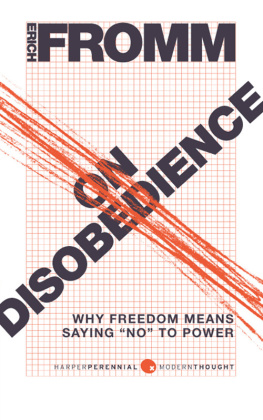Fromm - To have or to be?
Here you can read online Fromm - To have or to be? full text of the book (entire story) in english for free. Download pdf and epub, get meaning, cover and reviews about this ebook. year: 2015, publisher: Bloomsbury Academic, genre: Romance novel. Description of the work, (preface) as well as reviews are available. Best literature library LitArk.com created for fans of good reading and offers a wide selection of genres:
Romance novel
Science fiction
Adventure
Detective
Science
History
Home and family
Prose
Art
Politics
Computer
Non-fiction
Religion
Business
Children
Humor
Choose a favorite category and find really read worthwhile books. Enjoy immersion in the world of imagination, feel the emotions of the characters or learn something new for yourself, make an fascinating discovery.

- Book:To have or to be?
- Author:
- Publisher:Bloomsbury Academic
- Genre:
- Year:2015
- Rating:3 / 5
- Favourites:Add to favourites
- Your mark:
- 60
- 1
- 2
- 3
- 4
- 5
To have or to be?: summary, description and annotation
We offer to read an annotation, description, summary or preface (depends on what the author of the book "To have or to be?" wrote himself). If you haven't found the necessary information about the book — write in the comments, we will try to find it.
Fromm: author's other books
Who wrote To have or to be?? Find out the surname, the name of the author of the book and a list of all author's works by series.
To have or to be? — read online for free the complete book (whole text) full work
Below is the text of the book, divided by pages. System saving the place of the last page read, allows you to conveniently read the book "To have or to be?" online for free, without having to search again every time where you left off. Put a bookmark, and you can go to the page where you finished reading at any time.
Font size:
Interval:
Bookmark:
To Have or To Be?
TITLES IN THE BLOOMSBURY REVELATIONS SERIES
Aesthetic Theory , Theodor W. Adorno
On Religion , Karl Barth
The Intelligence of Evil , Jean Baudrillard
In Defence of Politics , Bernard Crick
Intensive Science and Virtual Philosophy , Manuel DeLanda
A Thousand Plateaus , Gilles Deleuze and Flix Guattari
Anti-Oedipus , Gilles Deleuze and Flix Guattari
Taking Rights Seriously , Ronald Dworkin
Discourse on Free Will , Desiderius Erasmus and Martin Luther
Education for Critical Consciousness , Paulo Freire
To Have or To Be? , Erich Fromm
Truth and Method , Hans Georg Gadamer
All Men Are Brothers , Mohandas K. Gandhi
Eclipse of Reason , Max Horkheimer
After Virtue , Alasdair MacIntyre
Time for Revolution, Antonio Negri
The Politics of Aesthetics , Jacques Rancire
An Actor Prepares , Constantin Stanislavski
Building a Character , Constantin Stanislavski
Creating a Role , Constantin Stanislavski
Some titles are not available in North America
To Have or To Be?
Erich Fromm

Bloomsbury Academic
An imprint of Bloomsbury Publishing Plc
| 50 Bedford Square | 1385 Broadway |
| London | New York |
| WC1B 3DP | NY 10018 |
| UK | USA |
www.bloomsbury.com
Copyright 1976 by The Estate of Erich Fromm
First published in 1997 by Continuum
Reprinted 2009, 2010, 2011, 2012
Originally published in The World Perspective Series by Harper & Row
This paperback edition first published in 2013 by Bloomsbury Academic
All rights reserved. No part of this publication may be reproduced or transmitted in any form or by any means, electronic or mechanical, including photocopying, recording, or any information storage or retrieval system, without prior permission in writing from the publishers.
No responsibility for loss caused to any individual or organization acting on or refraining from action as a result of the material in this publication can be accepted by Bloomsbury Academic or the author.
British Library Cataloguing-in-Publication Data
A catalogue record for this book is available from the British Library.
ePub ISBN: 978-1-4725-0455-5
Library of Congress Cataloging-in-Publication Data
A catalog record for this book is available from the Library of Congress.
Fromm, Erich, 19001980.
To have or to be?/Erich Fromm.
pages cm. (Bloomsbury revelations)
Includes bibliographical references and index.
ISBN 978-1-7809-3680-2 (pbk.)
1. Personality. 2. Ontology. I. Title.
BF698.F746 2013
128dc23
2013005634
Contents
What this series means
It is the thesis of World Perspectives that man is in the process of developing a new consciousness which, in spite of his apparent spiritual and moral captivity, can eventually lift the human race above and beyond the fear, ignorance, and isolation which beset it today. It is to this nascent consciousness, to this concept of man born out of a universe perceived through a fresh vision of reality, that World Perspectives is dedicated.
My Introduction to this Series is not of course to be construed as a prefatory essay for each individual book. These few pages simply attempt to set forth the general aim and purpose of the Series as a whole. They try to point to the principle of permanence within change and to define the essential nature of man, as presented by those scholars who have been invited to participate in this intellectual and spiritual movement.
Man has entered a new era of evolutionary history, one in which rapid change is a dominant consequence. He is contending with a fundamental change, since he has intervened in the evolutionary process. He must now better appreciate this fact and then develop the wisdom to direct the process toward his fulfillment rather than toward his destruction. As he learns to apply his understanding of the physical world for practical purposes, he is, in reality, extending his innate capacity and augmenting his ability and his need to communicate as well as his ability to think and to create. And as a result, he is substituting a goal-directed evolutionary process in his struggle against environmental hardship for the slow, but effective, biological evolution which produced modern man through mutation and natural selection. By intelligent intervention in the evolutionary process man has greatly accelerated and greatly expanded the range of his possibilities. But he has not changed the basic fact that it remains a trial and error process, with the danger of taking paths that lead to sterility of mind and heart, moral apathy and intellectual inertia; and even producing social dinosaurs unfit to live in an evolving world.
Only those spiritual and intellectual leaders of our epoch who have a paternity in this extension of mans horizons are invited to participate in the Series: those who are aware of the truth that beyond the divisiveness among men there exists a primordial unitive power since we are all bound together by a common humanity more fundamental than any unity of dogma; those who recognize that the centrifugal force which has scattered and atomized mankind must be replaced by an integrating structure and process capable of bestowing meaning and purpose on existence; those who realize that science itself, when not inhibited by the limitations of its own methodology, when chastened and humbled, commits man to an indeterminate range of yet undreamed consequences that may flow from it.
Virtually all of our disciplines have relied on conceptions which are now incompatible with the Cartesian axiom, and with the static world view we once derived from it. For underlying the new ideas, including those of modern physics, is a unifying order, but it is not causality; it is purpose, and not the purpose of the universe and of man, but the purpose in the universe and in man. In other words, we seem to inhabit a world of dynamic process and structure. Therefore we need a calculus of potentiality rather than one of probability, a dialectic of polarity, one in which unity and diversity are redefined as simultaneous and necessary poles of the same essence.
Our situation is new. No civilization has previously had to face the challenge of scientific specialization, and our response must be new. Thus this Series is committed to ensure that the spiritual and moral needs of a man as a human being and the scientific and intellectual resources at his command for life may be brought into a productive, meaningful and creative harmony.
In a certain sense we may say that man now has regained his former geocentric position in the universe. For a picture of the Earth has been made available from distant space, from the lunar desert, and the sheer isolation of the Earth has become plain. This is as new and as powerful an idea in history as any that has ever been born in mans consciousness. We are all becoming seriously concerned with our natural environment. And this concern is not only the result of the warnings given by biologists, ecologists and conservationists. Rather it is the result of a deepening awareness that something new has happened, that the planet Earth is a unique and precious place. Indeed, it may not be a mere coincidence that this awareness should have been born at the exact moment when man took his first step into outer space.
This Series endeavors to point to a reality of which scientific theory has revealed only one aspect. It is the commitment to this reality that lends universal intent to a scientists most original and solitary thought. By acknowledging this frankly we shall restore science to the great family of human aspirations by which men hope to fulfill themselves in the world community as thinking and sentient beings. For our problem is to discover a principle of differentiation and yet relationship lucid enough to justify and to purify scientific, philosophic and all other knowledge, both discursive and intuitive, by accepting their interdependence. This is the crisis in consciousness made articulate through the crisis in science. This is the new awakening.
Next pageFont size:
Interval:
Bookmark:
Similar books «To have or to be?»
Look at similar books to To have or to be?. We have selected literature similar in name and meaning in the hope of providing readers with more options to find new, interesting, not yet read works.
Discussion, reviews of the book To have or to be? and just readers' own opinions. Leave your comments, write what you think about the work, its meaning or the main characters. Specify what exactly you liked and what you didn't like, and why you think so.

